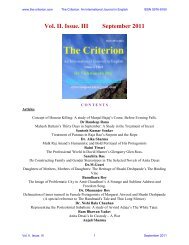Albert Camus: The Rebel Absurdist - The Criterion: An International ...
Albert Camus: The Rebel Absurdist - The Criterion: An International ...
Albert Camus: The Rebel Absurdist - The Criterion: An International ...
You also want an ePaper? Increase the reach of your titles
YUMPU automatically turns print PDFs into web optimized ePapers that Google loves.
www.the-criterion.com <strong>The</strong> <strong>Criterion</strong>: <strong>An</strong> <strong>International</strong> Journal in English ISSN 0976-8165<br />
nor futile.”(MS:110). It is Odeipus’ remark that all is well which <strong>Camus</strong> endorses as<br />
sacred.<br />
<strong>Camus</strong> shows the same outrage and indignation that is felt by Gilgamesh on the<br />
death of his best friend Enkidu. <strong>Camus</strong> is above all a moralist and that is why he judges<br />
the universe in moralistic terms. Existence, metaphysicians and mystics, have seen<br />
amoral. It is anthropomorphic, anthropocentric bias. But this metaphysical outrage is<br />
fortuitously transformed and elevated into an appreciation of the sublime. For him man is<br />
condemned to be alone, to live and fight the absurdity of his condition alone. He was a<br />
great Hellenist, a great devotee of universal beauty. It is because of his Hellenism that he<br />
abhorred ugly and “tortured and aimless” modern art.<br />
Art as Salvation<br />
<strong>Camus</strong> expressly states that art sustains him and it is faith in art that makes life<br />
endurable for him: “What has helped me bear an adverse fate will perhaps help me accept<br />
an overly favorable outcome –- and what has most sustained me was the great vision, the<br />
very great vision I have of art.”<br />
It is the “very great vision” of art which sustains <strong>Camus</strong> in the face of misfortune.<br />
Here he appropriates something like the religious vision. What is religion if not a sort of<br />
art? For Zen it is an art. It is simply changed perception of reality. Mountains are<br />
mountains at the end of the mystical path but one no longer is the same subject. One<br />
moves with one foot above the ground. Art is a mode of perception that creates an<br />
imaginative space beyond the normal one.<br />
<strong>Camus</strong>’ defense of artist against those who live in bondage to history and utopia is<br />
that he fights for freedom. <strong>An</strong>d he links this with passion for beauty (MS: 170). He<br />
rightly says that “Man can’t do without beauty”(MS: 170). Only one remark may suffice<br />
here that aesthetic view that Keats famously expressed in the words “Beauty is Truth and<br />
truth beauty” is specifically Eastern attitude. A. K. Coomaraswamy has expounded this<br />
masterfully in his magisterial works on art and aesthetics.<br />
Following Schopenhauer and Nietzsche both <strong>Camus</strong> and Beckett see art as one of<br />
the ways of salvation. It is through art that the moon that Caligula sought is brought to<br />
earth by <strong>Camus</strong>. <strong>Camus</strong> paid a tribute to spiritual value of music in Sud Essai sur la<br />
muasique” “In general and to conclude really fertile Music, the only kind which will<br />
<strong>The</strong> <strong>Criterion</strong><br />
move us and which we shall really relish, will be a Music of Dream which will banish all<br />
reason and all analysis.” Here he comes close to the mystic and the ecstatic. Nietzsche<br />
was precisely an ecstatic mystic and unconditional affirmation or yes saying is possible<br />
by virtue of mystical ecstasy and love alone as Giles Fraser has also argued.<br />
<strong>Camus</strong> thought that salvation was possible but not through the unfathomable, the<br />
mystical, but “through man’s own will.” This seems to be echo of Nietzsche whose<br />
superman wills in that heroic moment that everything eternally recur.<br />
We see <strong>Camus</strong> opening to transcendence is evident in his reflections on music, on<br />
art, on beauty despite his antitranscendence rhetoric. His youthful passionate lyricism is a<br />
move towards transcendence. <strong>The</strong> note he left beside his sleeping wife hints at this.<br />
<strong>Camus</strong> unlike mystics doesn’t find love eternal. “All the specialists in passion<br />
teach us, there is no eternal love but what is thwarted. <strong>The</strong>re is scarcely any passion<br />
Vol. III. Issue. I 15 March 2012
















